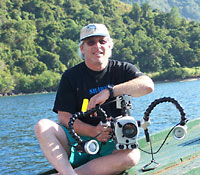Any
videographer worth his or her salt knows that without a good
port on their housing, their images will be reduced in color
saturation, resolution and, often size. While a bit more expensive
than standard plastic ports, for those wanting to film up to
their camcorders very highest standard, the Fathom glass lens,
by Light & Motion, is the only way to go.
Once I had my hands on this beauty
I knew in my heart that my film work would only go up from there
offering exceptional depth of field, saturation and ease of filming.
The quality of the Fathom lens is evident and intrinsic to every
Fathom lens I have ever used. The Fathoms 90 degree wide-angle
lens increases your field of view by 25 degrees from the original
standard 65 degree port to a full 90 degrees.
I have frequently encountered videographers
who were concerned that they would be using the right lens for
a particular dive. Should they switch to their macro or flat
port with diopters, use the standard wide angle or super wide
angle? With the new Fathom 90 degree lens, the question becomes
moot as this lens really can do it all, macro or wide angle with
ease.
Vignetting can be a frequent problem
with underwater video systems and it is now a relief not to have
to worry about it. During use, no matter where or when I used
my zoom control, there was absolutely no sign of a vignetting
problem. While I do not use my zoom controls very often, chosing
instead to get closer to my subjects, the Fathom 90 degree lens
offers full zoom through ability allowing the videographer to
get near 1:1 magnification at full telephoto. While testing the
lens in Costa Rica, I discovered that the only limitations which
existed were those presented to me by my camcorder. The Fathom
Lens did all that Light & Motion, a continual leader in underwater
photo and video systems, said it would. Soon to be released will
be a Fathom 110 degree lens which I hope to test for you as well,
especially as it has been touted as having the ability for 1:1
macro reproduction in full zoom.
The bottom line on the Light &
Motion Fathom 90 lens is that it is a shame that it wasn't available
sooner. Now that it is, for the underwater videographer it automatically
makes itself as essential as the housing itself.
 Steve
Douglas is a certified Apple Pro for Final Cut Pro 6 and
underwater videographer. A winner of the 1999 Pacific Coast Underwater
Film Competition, 2003 IVIE competition, 2004 Los Angeles Underwater
Photographic competition, and the prestigious 2005 International
Beneath the Sea Film Competition, where he also won the Stan
Waterman Award for Excellence in Underwater Videography and 'Diver
of the Year', Steve was a safety diver on the feature film "The
Deep Blue Sea", contributed footage to the Seaworld Park's
Atlantis production, the History channel's MegaDisaster show
and is a feature writer for Asian Diver Magazine. His first National
Geographic special will air in late 2008. Steve is one of the
founding organizers of the San Diego UnderSea Film Exhibition
and leads both underwater filming expeditions and African safaris
with upcoming excursions to Kenya in Aug.09, the Red Sea for
Nov.2009, and Truk Lagoon in Micronesia for July,2010. Feel free
to contact him if you are interested in joining Steve on any
of these exciting trips. www.worldfilmsandtravel.com
Steve
Douglas is a certified Apple Pro for Final Cut Pro 6 and
underwater videographer. A winner of the 1999 Pacific Coast Underwater
Film Competition, 2003 IVIE competition, 2004 Los Angeles Underwater
Photographic competition, and the prestigious 2005 International
Beneath the Sea Film Competition, where he also won the Stan
Waterman Award for Excellence in Underwater Videography and 'Diver
of the Year', Steve was a safety diver on the feature film "The
Deep Blue Sea", contributed footage to the Seaworld Park's
Atlantis production, the History channel's MegaDisaster show
and is a feature writer for Asian Diver Magazine. His first National
Geographic special will air in late 2008. Steve is one of the
founding organizers of the San Diego UnderSea Film Exhibition
and leads both underwater filming expeditions and African safaris
with upcoming excursions to Kenya in Aug.09, the Red Sea for
Nov.2009, and Truk Lagoon in Micronesia for July,2010. Feel free
to contact him if you are interested in joining Steve on any
of these exciting trips. www.worldfilmsandtravel.com
copyright © Steve
Douglas 2008
This article first appeared on www.kenstone.net
and is reprinted here with permission.
All screen captures and textual references are the property and
trademark of their creators/owners/publishers.